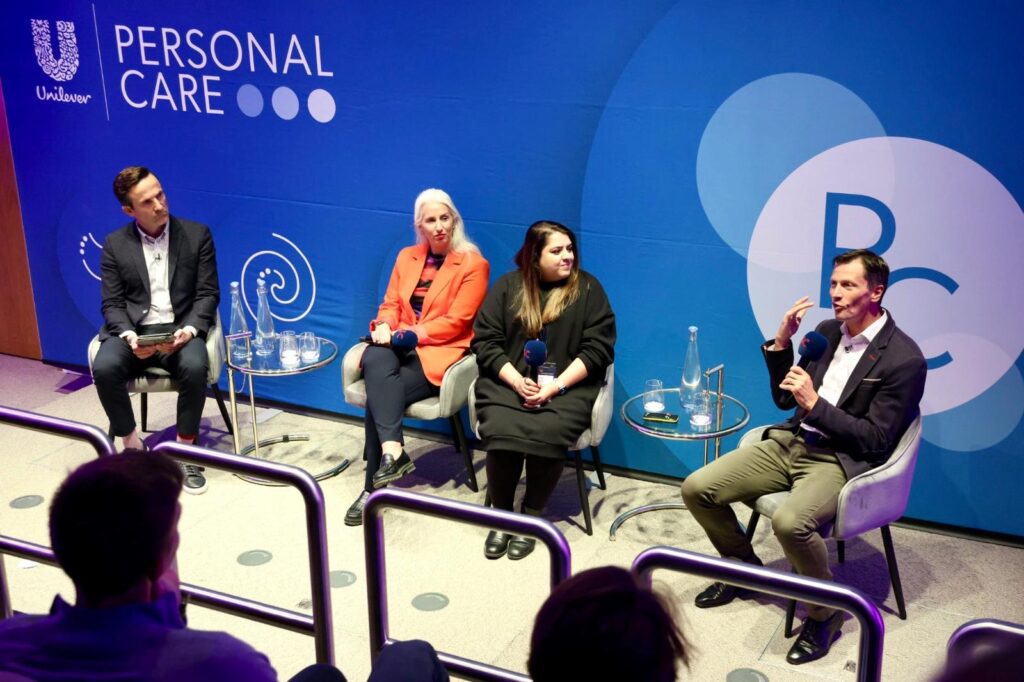Komal Patel, European Sports & Entertainment Partnerships Director- Unilever
Guillaume Sabran, Head of Sponsorship and Licensing-UEFA
Ashley Goldie, UKI | Senior Media & Content Manager – Personal Care -Unilever
UEFA Women’s Euro 2025TM was a powerful showcase of women’s football’s potential for sponsors. But it was also a reminder of the need to develop specific longer-term strategies.
For Unilever’s Ashley Goldie, the company’s brands are committed to credibility in their women’s football mission. She believes that their work can only be truly effective through community engagement and fan-led storytelling. To that end, social listening and understanding cues from fans are now paramount.
Komal Patel, Goldie’s colleague at Unilever as European Sports & Entertainment Partnerships Director, explained how the group’s various sponsorship activities – notably the men’s UEFA Euro 2024TM and this year’s British and Irish Lions rugby tour – have confirmed the importance of building dedicated campaigns around audiences and outcomes.
At UEFA Women’s Euro 2025TM, that approach proved especially valuable. UEFA’s Guillaume Sabran noted that the planning time available to Unilever was important to sponsor and rights holder alike. Tournament partners, he explained, add essential promotional capacity to each event and Unilever delivered considerable continental reach alongside a much deeper retail presence in every territory. Its ability to hit multiple desirable demographics was also critical.
That said, Sabran also championed the smaller, less visible initiatives UEFA partners brought to the championship. Lidl, for example, paid for awareness teams at every stadium to help fans who felt uncomfortable or had heard and seen abuse, and also provided feminine hygiene products to officials and at venues.
Activities like these made a tangible difference to fans’ experiences, getting fans talking about those sponsors and giving UEFA evidence of how the women’s football community can generate a different set of benefits from other sports sponsorships.
Goldie agreed that women’s sport is still at a point where sponsors can experiment – and that doing so is fundamental to understanding and delivering on fans’ needs. With women’s football moving to the intersection of culture, beauty and fashion, this is the moment to “ask for forgiveness, not permission” in creating activation ideas.
At the same time, she said, the different environment around women’s football should also be reflected in how success is measured. Female players have their own emotional connection with their younger fans, while there is also room for brands to drive important public conversations – as Unilever did with its Persil campaign ‘Every Stain Should Be Part of the Game’, taking on taboos around sport and menstrual cycles.
Those factors are bound to come to bear on discussions around financial commitments and resourcing – both between sponsors and rights holders and within brand organisations themselves.
For Patel, that makes it even more vital to be clear about sponsorship objectives “from the get-go” and be brave enough to change course where necessary – not least as tournament properties evolve from one edition to the next. In women’s sport, she added, each market is at its own stage in that progress. It is crucial not just to tailor activities to those individual markets but also to prepare still-developing territories for campaign messaging.
This summer’s events have amply demonstrated the value women’s football is already delivering. With better data, richer insights and stronger collaboration, this panel agreed that even more fascinating possibilities lie ahead.

